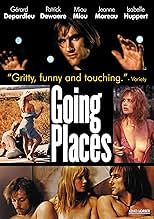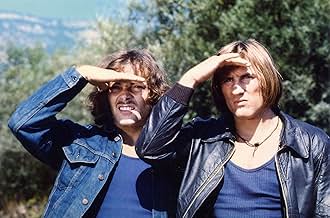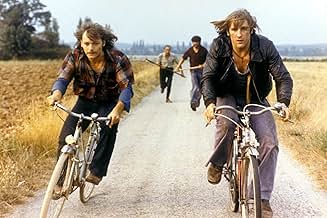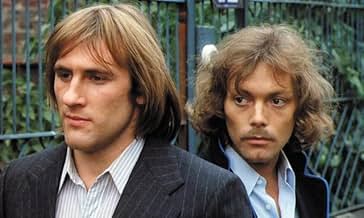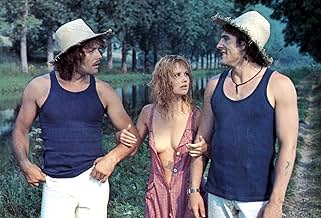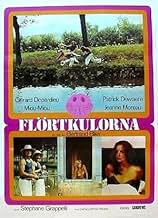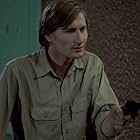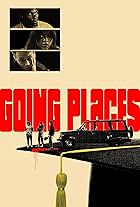Two thugs travel around France terrorizing their compatriots.Two thugs travel around France terrorizing their compatriots.Two thugs travel around France terrorizing their compatriots.
Featured reviews
This is one a most famous movies of the French sexual empowerment of the seventies, starring Gerard Depardieu and Patrick Dewaere in extremely sarcastic roles. It is also one of the many dark psychological dramas of the seventies/eighties, such as "Serie Noire", "Buffet Froid", "Beau Pere", all realized by Blier.
However, I would like to correct the previous comment that was posted on the movie: the translated title in English is very far from the French version. It is true that both protagonists are "going places", but the title in French could be literally translated by "the waltz dancers", which is a metaphor for the movement of the testicles...
However, I would like to correct the previous comment that was posted on the movie: the translated title in English is very far from the French version. It is true that both protagonists are "going places", but the title in French could be literally translated by "the waltz dancers", which is a metaphor for the movement of the testicles...
"They don't make movies like this anymore" has been used for so many movies but in the case of "Les Valseuses" (or "Going Places") you might say, "they can't make movies like this anymore". Whether it's a positive or a negative is a matter of opinion.
From the way I see it, only a gender swap would justify a remake for it's impossible to imagine a filmmaker making a film, let alone a debut, about two marginals at the prime of their masculine strength enjoying harassing and assaulting women, making us wish they could 'just' keep on stealing cars or money. It's quite fitting that the title is a slang term meaning "balls" in French as that's what it takes to dare concoct such a vitriolic story, even in the liberated post-68 France. One can despise Bertand Blier's misuse of talents but not without admiring his nerve.
The film met with commercial success and was one of the highest-grossing of the year only topped by the erotic "Emmanuelle". I guess the timing worked in favor of Blier for the cinematic community was eager to embrace a sort of free-spirited joyful anarchical ride by thugs who don't give a damn about the consequences of their action in their quests for instant pleasures. It's a revenge of the "populo" against the little ones and the weaselly bourgeois hiding in the limited coziness of their suburban life.
The opening sequence says it all, Jean-Claude played by Depardieu is sitting in a caddie (the symbol of consumerist society) pushed by Pierrot (Patrick Dewaere), they swing across a deserted street, preying on a fat woman they end up cornering next to her apartment, steal her purse after stealing a few kisses. The scene is not enjoyable but has the merit of setting the tone, making the starting point of your rooting below "zero" and it's a credit to a solid narrative and the incredible writing talent of Blier (who wrote the original 72 novel) to make these characters reach a certain point of likability.
They're no better at the end, but they realize sex and money can't be the only drivers, there's got to be more than or behind that. The caddie scene already established them as drifters and vagabonds, but that's the stuff poetry was made off and in the first post-war oli-crisis, where good society looked for scapegoats, they were targets, too. And so when they bring a stolen car back to its owner Pierrot gets shot in the groin. Their only trophy is Marie-Ange (Miou-Miou) a worker used and abused by the car owner. Point is made that even the victims aren't always innocent in that rigged game of life.
One could see a tactical trick from Blier who doesn't make us root for his antiheroes rather than show the rest no better than them, but there are exceptions: the doctor who heals Pierrot isn't immune to a robbery, Jean-Claude even makes the sinister threat of "paying goodnight to his children". And later in a train, they watch a woman (Brigitte Fossey) breastfeeding her baby and one thing leading to another, Pierrot suckles the woman's breast while Jean-Claude titillates her. Now that's hardly a detail and as horrific as the scene is (and it is) it mostly highlights the insecurity of the thugs and their incapability to draw moral lines into their actions. A honest question would be "why"?
They're bad guys, but indeed, why? Marie-Ange is used as a sexual object and while Jean-Claude is having a good time, she doesn't. Pierrot can't bring himself to pleasure fearing impotence from the wound. Earlier, the car mechanic took Marie-Ange as a 'benefit in kind' but got upset because she was frigid. Marie-Ange is the catalyst character in the way she reveals the limit of the Pierrot and Jean-Claude's hedonism, inasmuch as they want to bring her to pleasure, they're so focused on their own that ultimately it backfires at them. It might explain Pierrot's need for tenderness in the infamous train sequence, a wish to reassure himself that it's still working. It's a quest of pleasure but unlike money, it takes two to get it, and it's a miracle that nothing coming close to a real rape is shown.
I guess that would have prompted people to walk out the theaters and Ebert himself, hated the film for its uncompromising sociopathy, saying Bertrand Blier (who wrote the original novel) almost presented himself as a man one would like to spend time with. Still, despite the virulent criticism it got in France, the film became the equivalent of "Easy Riders". There is wildness, unpredictability but even a tenderness during a segment where the duo meets a former inmate played by Jeanne Moreau, a woman they wish to bring her as much pleasure as she needs. Ultimately even Marie-Ange would reach the fourth sky and as the plot moves forward, the film gets a little less macho-centric. And by playing it a little less 'fast and furious', the two thugs become more genuinely appealing.
And their appeal with a teenager named Jacqueline (Isabelle Huppert) speaks volume about the way self-proclaimed and careless rebels are regarded, like romantic figures. Any lesser film would have made it look manipulative but Dewaere and Depardieu have such great chemistry and are so complementary, one is nervous and cerebral, the other is flamboyant and exuberant, so maybe the success of the film lies in that simple truth, with the right cast, you can get away with everything, except for a few scenes. But to call Blier misogynistic would be unfair, unlike "Last Tango in Paris", the shooting went well, no polemic resurfaced and even Miou-Miou said she had great memories (she even worked with Blier again).
And thankfully, Blier would sign other great movies where women would be treated with more consideration, but heneeded one shocker, one punch in the guts of good taste and social convenience to put himself in the radar. And so he did.
From the way I see it, only a gender swap would justify a remake for it's impossible to imagine a filmmaker making a film, let alone a debut, about two marginals at the prime of their masculine strength enjoying harassing and assaulting women, making us wish they could 'just' keep on stealing cars or money. It's quite fitting that the title is a slang term meaning "balls" in French as that's what it takes to dare concoct such a vitriolic story, even in the liberated post-68 France. One can despise Bertand Blier's misuse of talents but not without admiring his nerve.
The film met with commercial success and was one of the highest-grossing of the year only topped by the erotic "Emmanuelle". I guess the timing worked in favor of Blier for the cinematic community was eager to embrace a sort of free-spirited joyful anarchical ride by thugs who don't give a damn about the consequences of their action in their quests for instant pleasures. It's a revenge of the "populo" against the little ones and the weaselly bourgeois hiding in the limited coziness of their suburban life.
The opening sequence says it all, Jean-Claude played by Depardieu is sitting in a caddie (the symbol of consumerist society) pushed by Pierrot (Patrick Dewaere), they swing across a deserted street, preying on a fat woman they end up cornering next to her apartment, steal her purse after stealing a few kisses. The scene is not enjoyable but has the merit of setting the tone, making the starting point of your rooting below "zero" and it's a credit to a solid narrative and the incredible writing talent of Blier (who wrote the original 72 novel) to make these characters reach a certain point of likability.
They're no better at the end, but they realize sex and money can't be the only drivers, there's got to be more than or behind that. The caddie scene already established them as drifters and vagabonds, but that's the stuff poetry was made off and in the first post-war oli-crisis, where good society looked for scapegoats, they were targets, too. And so when they bring a stolen car back to its owner Pierrot gets shot in the groin. Their only trophy is Marie-Ange (Miou-Miou) a worker used and abused by the car owner. Point is made that even the victims aren't always innocent in that rigged game of life.
One could see a tactical trick from Blier who doesn't make us root for his antiheroes rather than show the rest no better than them, but there are exceptions: the doctor who heals Pierrot isn't immune to a robbery, Jean-Claude even makes the sinister threat of "paying goodnight to his children". And later in a train, they watch a woman (Brigitte Fossey) breastfeeding her baby and one thing leading to another, Pierrot suckles the woman's breast while Jean-Claude titillates her. Now that's hardly a detail and as horrific as the scene is (and it is) it mostly highlights the insecurity of the thugs and their incapability to draw moral lines into their actions. A honest question would be "why"?
They're bad guys, but indeed, why? Marie-Ange is used as a sexual object and while Jean-Claude is having a good time, she doesn't. Pierrot can't bring himself to pleasure fearing impotence from the wound. Earlier, the car mechanic took Marie-Ange as a 'benefit in kind' but got upset because she was frigid. Marie-Ange is the catalyst character in the way she reveals the limit of the Pierrot and Jean-Claude's hedonism, inasmuch as they want to bring her to pleasure, they're so focused on their own that ultimately it backfires at them. It might explain Pierrot's need for tenderness in the infamous train sequence, a wish to reassure himself that it's still working. It's a quest of pleasure but unlike money, it takes two to get it, and it's a miracle that nothing coming close to a real rape is shown.
I guess that would have prompted people to walk out the theaters and Ebert himself, hated the film for its uncompromising sociopathy, saying Bertrand Blier (who wrote the original novel) almost presented himself as a man one would like to spend time with. Still, despite the virulent criticism it got in France, the film became the equivalent of "Easy Riders". There is wildness, unpredictability but even a tenderness during a segment where the duo meets a former inmate played by Jeanne Moreau, a woman they wish to bring her as much pleasure as she needs. Ultimately even Marie-Ange would reach the fourth sky and as the plot moves forward, the film gets a little less macho-centric. And by playing it a little less 'fast and furious', the two thugs become more genuinely appealing.
And their appeal with a teenager named Jacqueline (Isabelle Huppert) speaks volume about the way self-proclaimed and careless rebels are regarded, like romantic figures. Any lesser film would have made it look manipulative but Dewaere and Depardieu have such great chemistry and are so complementary, one is nervous and cerebral, the other is flamboyant and exuberant, so maybe the success of the film lies in that simple truth, with the right cast, you can get away with everything, except for a few scenes. But to call Blier misogynistic would be unfair, unlike "Last Tango in Paris", the shooting went well, no polemic resurfaced and even Miou-Miou said she had great memories (she even worked with Blier again).
And thankfully, Blier would sign other great movies where women would be treated with more consideration, but heneeded one shocker, one punch in the guts of good taste and social convenience to put himself in the radar. And so he did.
Bertrand Blier is indeed l'enfant terrible of French cinema and in the seventies he always could shock the public. Filmed with his fave duo (Depardieu and Dewaere) and the usual dose of sex (Miou-Miou plays her typical role, at least the one from the seventies as little could we know that a decade later she would be the best French actress ever). In first "Les Valseuses" is also one of the first roadmovies as the viewer is just taken to some journeys of two little criminals. Those who only are satisfied with family life, or simply know nothing more, the movie would be quite a shocker but this movie is more than just that, it just let you think of all the usual things in life (working for the car, being bounded at work etc.). It's a sort of critic towards the hypocrite society we're living in. Great job and it just makes you wish two things : Dewaere died just too young as he was a topactor and of course Depardieu, he'd better should have stuck with French movies as he proves here that no one can beat him. Timeless classic and 20 years later it will still shock some...
The movie has a distinct (albeit brutish and rough) humanity for all its borderline depravity - the zippy/lyrical score points up the comic side of their misadventures, and even when they're at their most thuggish (like terrorizing the woman on the train), a semi-pitiful vulnerability lurks never far away (Dewaere sucks on her breasts like a baby). Blier cuts away from the scene where Depardieu may be about to rape Dewaere, so we're never sure how explicitly to read the manifestly homoerotic aspect of their relationship - either way, that incident is the start of their relative humanization (so the movie could certainly be read as pro-gay, although it could likely be read as pro-anything you want). The movie has many objectionable scenes and points of sexual politics and is probably best taken as a general cartoon on the foibles of both sexes, making a mockery of the whole notion of sensitivity and honesty, and hitting numerous points of possible profundity on the basis that if you fire off enough shots, some of them are bound to hit.
A wonderful, free flowing, often lyrical film that whisks you along, ever smiling, even if there are truly shocking incidents along the way. One gasps at the way the women are treated and yet ultimately they seem to come through very well and it is much credit to all concerned that so many potentially disastrous scenes all work so very well. This is possibly Depardieu's best performance, certainly his most natural. Jeanne Moreau performs outstandingly in what must have been a very difficult role to play and including vigorous sex scenes with a couple of guys at least half her age. Miou-Miou is lovely throughout and again has very difficult scenes to play. Initially this seems a down and dirty misogynist rant/romp but as the tale and characters unfold a much more tender and honest picture emerges. In the end this uncompromising and daring film demands respect.
Storyline
Did you know
- TriviaThe original French title is slang for "balls" (the testicular variety).
- GoofsAll entries contain spoilers
- Alternate versionsDespite being already rated "18" the German version is heavily cut, removing the following scenes:
- The rape of "Ursula" and the fight/chase sequence with the locals afterwards.
- The fight with the vigilantes after meeting Marie-Ange.
- Between getting a new car from the mechanic and looking for a doctor there's a sequence missing when Marie-Ange has sex with the mechanic.
- Hitting and driving over the store detective.
- The theft of two bikes from a farmhouse.
- Jean-Claude having sex with Pierrot just before leaving the beach house (this is later referred to by Pierrot when he says: "You surprised me, you bastard!")
- A longer sex scene between Jeanne, Jean-Claude and Pierrot after she starts to get down on Pierrot.
- In-between cuts of Marie-Ange being "educated" by Jacques, while Jean-Claude and Pierrot wait and fish outside the farmhouse.
- Jacqueline being "educated" by Jean-Claude, Pierrot and Marie-Ange.
- ConnectionsFeatured in Un jour, un destin: Patrick Dewaere: Le dernier jour (2007)
- How long is Going Places?Powered by Alexa
Details
- Release date
- Country of origin
- Language
- Also known as
- Los rompepelotas
- Filming locations
- Veuvey-sur-Ouche, Côte-d'Or, France(house by the canal)
- Production companies
- See more company credits at IMDbPro
Box office
- Gross US & Canada
- $771,540
- Runtime1 hour 57 minutes
- Sound mix
- Aspect ratio
- 1.66 : 1
Contribute to this page
Suggest an edit or add missing content


![Watch Bande-annonce [OV]](https://m.media-amazon.com/images/M/MV5BYThkNDA3OGQtYTRkMy00MDEyLWFiODctM2EzMjZjNDk4NjU5XkEyXkFqcGdeQXRyYW5zY29kZS13b3JrZmxvdw@@._V1_QL75_UX500_CR0,47,500,281_.jpg)

